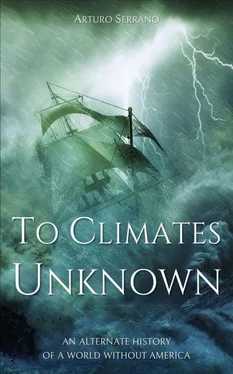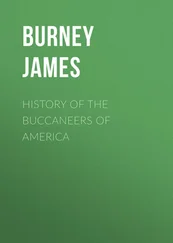Azlor’s voice shook as he asked, “For how long have they been hiding this machine?” He tried to retrace mentally the milestones in the ascent of the Canutic Empire, knowing that everyone in the room was doing the same exercise, afraid to venture a number of years, feeling the seed of anger sprout from fertile speculations.
“Are you suggesting,” asked Gerbaut, “that this is why our ships vanish?”
The young Mutis felt his back dampen with cold sweat. Occasional disappearances of ships had been treated as normal, either as random card shuffles that yielded winners and losers, or else as surprise demonstrations of God’s absolute will, for far longer than he’d lived. He looked around and realized that the same was true of everyone there.
Maria Theresa pressed her hand against the hull more forcefully, feeling frustrated that she couldn’t grasp it in its entirety. “A naval power armed with this kind of ship for at least the past century would have been able to manipulate history according to its pleasure.”
The governor started to pronounce a name he dared not finish. He saw the tremor in the queen’s eyes and knew she’d heard him.
The name was Philip.
At the start of the century, it had briefly been the case that Philip of the House of Bourbon, brother of the king of France, had been offered the Iberian throne, but the thought that France could gain control of the Iberian colonies in addition to its own had mobilized the Protestant nations to another war, this one over the question of the Iberian succession. While the French pretender was en route to Naples to pacify the Kingdom of the Two Sicilies, his ship sank, and the throne went to the other candidate, Charles of the House of Habsburg, Holy Roman Emperor and Maria Theresa’s father.
The implication was an offense of the highest magnitude. The independence of Nova Dania had weakened Denmark’s military influence, which was the reason why initial partition plans for the Iberian Empire during the succession crisis had failed, but the truth of her situation couldn’t be avoided. She only sat on the throne of the Iberian Union because the Canutic Empire had wanted her to, and not by divine decree.
“This is outrageous,” blurted out Gerbaut, regarding the vessel with contempt. “This means the wars of religion never ended. This means the Danish have committed entire generations’ worth of acts of war, one after another, with full impunity.”
“It’s worse,” said the queen. “This is a usurpation of God’s place as arbiter of history. I don’t care how many ships like this they may possess; I will make it the mission of the Iberian Union to destroy the Canutic Empire.”
No one wished to break the silence that followed. The four men knew the Iberian Union had nothing that could oppose this machine. They had no idea how it was made or how it worked, and the queen was still losing ships every month. She could barely hold the reins of her colonies anymore; New Granada and Santiago all but ruled themselves, and with Scotland still occupying Darién, the Peruvian silver supply could easily slip from her hands. Gerbaut felt it was his duty to warn, “To tell Your Majesty the truth, our bellic capabilities seem outmatched.”
“Do you think I don’t know that?” she yelled. “If we don’t have a weapon against this, get me one!” Then she turned to Godin and Mutis, the only learned men within reach and thus suitable targets of her furious decree. “Build it yourselves if you have to, but I don’t want to hear that we’re defenseless against those heretics. By whatever means, we must vanquish the Protestants for the glory of Christ. Now go and find me the weapon that will give us our victory!”
Afternoon, May 12 (Gregorian), 1756
Santos
From Cádiz to Toledo, to search for diaries and old letters; then to Coimbra, to gather testimonies by acquaintances; and then to Rotterdam, to find safe passage to Dutch Brazil: Louis Godin and José Celestino Mutis had embarked on an espionage mission only briefly delayed by the bothersome fact that any trip between Europe and the Indies was safer on a Dutch ship.
After disembarking at the colony port of Mauritsstad, they hired a smaller vessel to take them southward along the coast of the continent, to an island just off the city of São Paulo, called São Vicente. They carried royal letters of introduction to ensure their accommodation at the Carmelite monastery, but they didn’t unpack; as soon as they landed, they started asking around for the house that had belonged to the doctor Francisco Lourenço Rodrigues. Finding it didn’t take them too many hours of wandering. They were received by a young lady who at first didn’t take well to the unexpected visit, but their letters of introduction once again did the trick.
They sat in her living room, voicing their awkward gratitude in careful Spanish. She ordered one of her slaves to serve them cups of coffee with cubes of sugar. “My grandfather’s house is honored by the presence of emissaries from Her Majesty,” she began, and repeated herself, more slowly, so they would understand her Portuguese.
“We count ourselves fortunate,” replied Godin, “that the house still stands. We learned that most of the doctor’s sons joined the clergy and spread all over Christendom. Our assignment would have been much more challenging if we’d had to track down each of them.”
“I can imagine the difficulty. Even my father’s generation is dying out. But I’ll be happy to give any help you need.”
Godin opened a satchel he’d kept close to him at all times during their journey, and leafed through a journal with pictures more valuable than all the sugar in Brazil. “The reason we’re here is to examine some papers that belonged to your uncle Bartolomeu.” He showed her one of the pages, and she turned pensive.
Mutis guessed she was trying to remember which of all her uncles they meant; Doctor Rodrigues had sired a dozen children. “Your uncle,” he explained, “has become a topic of interest to Her Majesty. It was a bit hard to find his place of origin because he adopted the surname Gusmão as an homage to one of his teachers.”
“Oh, I think I know who you’re talking about.” She examined the page again. It had a drawing that resembled a fat goose with eggs in its belly. It didn’t seem familiar to her. “I don’t think I even met him; he must have left for the seminary before I was born. You’ll have to forgive that I have so few memories of him. He died twenty years ago.”
“Twenty-two,” corrected Mutis.
“There you have it: I was a child. What is it that you need from him?”
“We have been told,” replied Godin, “that after his death, his personal belongings were transported back here, to his childhood home. Priests aren’t known for their many possessions, but we’re interested in collecting his writings, and we noticed that some portions were incomplete. We were hoping that at least there could be a notebook among his things.”
She raised her eyes to the ceiling, making a mental map of the house. “Usually, the ships with letters and boxes do reach São Vicente. It’s mostly the ships bound for Europe that sink. But I’ll have to send a slave to check in the upper rooms. Honestly, I don’t often go into the rooms of my dead relatives. It may take a while to identify the right trunk.”
“May we do the searching, if you don’t mind?” asked Mutis.
“I don’t see why not,” replied the woman, to their relief. “You’re here on Queen’s business, after all.”
“Thank you,” said Godin before finishing his coffee. “We can’t reveal the nature of our mission, but you should know that you’re doing a priceless service to the Iberian Empire.”
Читать дальше












